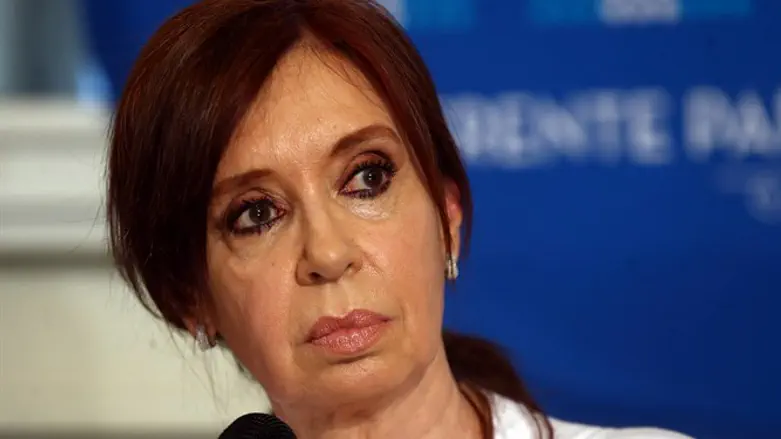
Former Argentine president Cristina Kirchner appeared before a judge leading a major probe into corruption under her government Monday, hitting out at what she described as "judicial persecutions" to rule her out of next year's elections.
More than a dozen elite businessmen and former government officials were arrested after La Nacion newspaper reported on August 1 that millions in bribes were delivered by a ministerial chauffeur to Kirchner's residences, both during her presidency and that of her late husband Nestor.
The driver's meticulous records of the cash deliveries -- allegedly payments from business leaders in exchange for public works contracts -- form the basis of the investigation.
Dressed in a trouser suit and waving to supporters, Kirchner pushed her way past journalists into Judge Claudio Bonadio's court in Buenos Aires where she denounced the case as an example of the political persecution she has faced under her right-wing successor Mauricio Macri.
"This is a new regional strategy to outlaw leaders, movements and political forces that expanded rights and allowed millions of people out of poverty during the first decade and a half of the 21st Century," Kirchner wrote Monday on Twitter.
As a senator, Kirchner enjoys congressional immunity from imprisonment, though not prosecution. She is facing trial in several other corruption cases and Bonadio has petitioned the Senate to lift her immunity.
He wants to search Kirchner's properties for evidence in the "corruption notebooks" case, so called because the driver, Oscar Centeno, recorded over a decade of cash drops in a set of notebooks.
According to Centeno's bombshell evidence, the Kirchners' residence in Buenos Aires was the venue for the handover of millions of dollars in cash, with others taking place at the Casa Rosada government headquarters and the Olivos official presidential residence.
Prosecutor Carlos Stornelli has said a total of $160 million in bribes was handed over during a 10-year period from 2005-15.
"There is no doubt that the copybooks describe in detail the way in which the Kirchners raised money illegally for seven years without any alarm going off at any oversight agency," said Nicolas Solari of the consultancy Poliarquia.
So far, eight business leaders have confessed and struck plea-bargain deals.
Angelo Calcaterra, a cousin of Macri, acknowledged having ordered the payment of cash requested as a bribe in order to receive government contracts.
Testifying before the judge, he said he thought this was a mandatory election campaign contribution.
Bonadio suspects the 65-year-old of being the main beneficiary of a system of corruption funded by the public works sector, via the planning ministry.
Refusing to answer questions, the former president instead hit out angrily at what she said was blatant political persecution engineered by Macri.
"From the moment the engineer Mauricio Macri assumed power I have been subjected to multiple judicial persecutions," Kirchner said in a written statement delivered to the court.
The aim, she said, was her "political elimination" ahead of next year's presidential elections. She has long railed against Bonadio as her tormentor-in-chief.
"Since December 15,2015, six criminal cases have been produced against me, all in Comodoro Py (the Federal Court). Of the six, five have been opened, or being investigated by, Bonadio."
For all her battles with the judicial system, Kirchner remains one of Argentina's most popular figures, leader of the opposition to Macri's center-right government.
On Sunday, after confirming she would attend Monday's hearing, she called on her supporters not to demonstrate outside the courthouse.
Monday's court appearance was the fourth time Kirchner has appeared before Bonadio, who is investigating the leftist former president in a slew of other corruption cases. They include alleged foreign exchange manipulation and the signing of a memorandum with Iran that Bonadio argues effectively protected from prosecution Iranian suspects in the deadly 1994 bombing of Argentine Jewish centers.
Centeno, who has been questioned by Bonadio and authenticated the notebooks given to La Nacion, worked as a chauffeur for the former deputy planning minister Roberto Barrata, who is also under arrest.
The case involves some of Argentina's biggest business leaders, among them Calcaterra, former directors of the Italo-Argentine company Techint and construction industry leaders.
The notebooks, said Leandro Despouy, a former government auditor general, "implicate a large number of businessmen, not just government officials."
He said the case could end up being as big in Argentina as the ground-shaking "Car Wash" corruption investigation in neighboring Brazil, which has ensnared and sullied many prominent members of the Brazilian political and business elite.